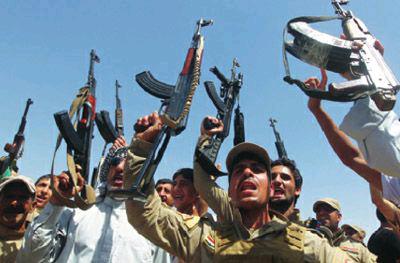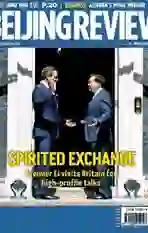The Iraqi Redemption
2014-07-28ByDingYing
By+Ding+Ying

The Pandoras Box of Iraq was opened in 2003 when Washington kicked off the Iraq War and overthrew former Sunni Iraqi President Saddam Hussein. Even though the last U.S. troops pulled out of Iraq on December 18, 2011, the country failed to find stability after the United States hit-and-run invasion.
A new wave of terror, violence and conflicts between political and religious factions has swept Iraqis into deep darkness. The experience of the last 11 years shows that, unlike a fairy tale, a sword-wielding prince has not arrived to save the Iraqis. Only by discarding sectarian conflicts and uniting as a whole, can Iraq complete its self-redemption.
A fractured country
The war-torn country has continued to deteriorate in 2014.
In January, the Islamic State of Iraq and the Levant (ISIL), an Al Qaeda breakaway group, declared its aim to create an independent state in the greater Syria-Iraq border area. Militant rebels, in which the ISIL makes the main force, recently advanced with shocking speed in northern Iraq. Insurgents occupied a number of cities there, including the countrys second biggest city Mosul. As they marched toward the capital city Baghdad, Iraq once again became a focus of global attention.
“Sectarian divisions still lie at the root of Iraq,” Liu Yueqin, a senior research fellow on Middle East studies with the Chinese Academy of Social Sciences (CASS), told Beijing Review.
She pointed out that current Shiite Prime Minister Nuri al-Malikis party obtained 92 of the 328 seats in the countrys National Assembly elections on April 30, resuming its ruling party status. The result caused dissatisfaction among other political groups, especially the Sunnis, leading the ISIL to swoop in. The insurgent groups, spearheaded by ISIL militants, are mainly comprised of the countrys Sunnis.
“Sunni soldiers and officers in the govern- mental army believe that the current Shiitedominated government has treated Sunnis unfairly, and refuse to fight and die for the Maliki administration, choosing instead to flee from anti-government rebels and bringing about the Iraqi Governments failure in northern Iraq,” said Liu.
Maliki fired some senior security officers on June 17 after thousands of Iraqi soldiers and officers abandoned their posts in Iraqs northern province of Nineveh and then in large parts of the provinces of Salahudin and Diyala.
Li Shaoxian, Vice President of the China Institutes of Contemporary International Relations, concluded that the current turmoil in Iraq is the accumulated consequence of Washingtons misguided policies.endprint
Li stated that the war in 2003 had buried a landmine for the current chaos in Iraq.
“The war broke the political balance inside and outside Iraq,” said Li. The Shiites make up about 60 percent of the countrys population; the Kurds, about 20 percent; and the Sunnis, merely 20 percent. He explained that Saddams rule, wherein the minority of Sunnis were in charge of the countrys majority of Shiites, was based on dynamics formed in the countrys history. By overthrowing Saddam and propping up Shiites through democratic elections, the United States inevitably broke the traditional political balance inside Iraq, he said.
Moreover, the Iraq War destroyed the regional geopolitical balance formed between the Arabs and the Persians over the past 1,000 years along the Iran-Iraq border. By conducting two wars in Iraq and Afghanistan, the United States actually removed two opponents of its foe Iran—the Taliban and Saddams administration. After Iraqi Shiites became the ruling force, Irans influence penetrated into Iraq. Iran, Iraq, Syria and Lebanon connected into a“Shiite plate,” posing as the opposite of Saudi Arabia-headed Sunni groups in the Middle East, making the regional situation even more sensitive, said Li.
Furthermore, Washington intended to dismantle Saddams political structure by implementing a policy of containing the Sunnis, but in fact caused the splintering of the Shiites, the Sunnis and the Kurds in the country. U.S. suppression created a hotbed for the Sunnisresistance, Li said.
Li added that U.S. President Barack Obama pulled U.S. troops out of Iraq in a rush in 2011 before the Iraqi Government was fully prepared, in effect handing Iraq to anti-government militants. “If U.S. troops hadnt left Iraq so early, the ISIL would not have been able to develop without resistance,” Li stressed.
The forces that make up the ISIL used to be part of the Syrian opposition. Washingtons policy of striking Syrias Bashar al-Assad administration helped the ISIL develop in Syria. “By cultivating the Syrian opposition, including the ISIL, Washington finally has to swallow its bitter concoction,” said Li.
Iraqs future
The crisis in Iraq surely will not be resolved easily. Although the international community has been keeping an eye on the Iraqi situation, no country will voluntarily help Washington clean up the mess that it created. In any case, Iraq cannot resume peace and stability, even under U.S. sanctuary, until it sorts out its sectarian divisions.endprint
Saudi Arabia rejected foreign intervention in Iraqs domestic affairs on June 14, sensing a worsening security situation. The Sunni-dominated country blamed the Maliki administrations “sectarian and exclusionary policies” for fuelling the insurgency.
While Turkey is sending humanitarian aid to the violence-hit cities of Iraq, particularly to the areas populated by Iraqi Turkmens, who share close cultural and linguistic ties with Turkey, Jordans army has been on high alert to protect the country from being infected.
China affirmed that it supports the Iraqi Governments efforts to safeguard national security and stability and combat terrorism, said Hua Chunying, spokeswoman of the Chinese Ministry of Foreign Affairs on June 17.
There are currently more than 10,000 Chinese employees working in Iraq, most of whom are concentrated in relatively safe areas. The spokeswoman said that China will continue to monitor closely the situation in Iraq, and depending on how the situation evolves, take all necessary measures to safeguard the security of Chinese citizens in Iraq. The Chinese side has long been providing a variety of assistance to Iraq, she added, and China will continue to do so as its capacity allows.
The United States declared that it would not send ground troops to Iraq, but dispatched a carrier and destroyers to the Gulf region on standby.
Meanwhile, the White House began its deployment of up to 275 U.S. soldiers in Baghdad on June 13 “to provide support and security for U.S. personnel and the U.S. Embassy in Baghdad,” according to Obama.
“The Obama administration has adopted a contraction strategy in the Middle East, including Iraq and Syria, so as to focus on the ‘pivot-toAsia strategy,” said Liu with the CASS. “It will not put its heels back into the same swamp it just fled from.”
Liu predicted that Washington would rather let others, like NATO, head the possible war against Iraqi rebels. Besides, she added, the Maliki administration still is capable of fighting back. However, if the situation slides out of control, Washington will not simply leave Iraq alone, because the country remains under U.S. influence, said Liu.
The crisis has even brought Washington and its foe Tehran together to discuss ways to stop the violence on the sidelines of nuclear negotiations in Vienna, Austria, on June 14, due to their common support for the Shiite-dominated Maliki administration. U.S. Secretary of State John Kerry said the United States was “open to any constructive process.”endprint
Liu said that for now, Iran is the one that is more eager to facilitate such military cooperation, and Washington will not accept the suggestion until the last minute. Once Washington decides to join hands with Iran, it must adjust its policy on Irans nuclear issue, Liu explained.
Former Chinese Ambassador to Iran Hua Liming pointed out that the United States is now reaping what it sowed, forcing Washington to adjust related policies—especially concerning Iran. The former ambassador said that the United States must cooperate with Iran if it wants to discuss the future of Iraq. Moreover, it needs Irans support in solving problems in Syria and Afghanistan.
Undoubtedly, the terrible situation has brought serious economic problems in addi- tion to mass casualties in Iraq. According to a UN report, 9,475 civilians were killed in violent attacks last year, hitting a record in the postSaddam era. In the first six months of 2014, over 500,000 Iraqis became homeless due to the anti-government military confrontation.
Liu pointed out that the turmoil has greatly impacted Iraqs backbone oil industry, as well as foreign investment. International oil prices increased over 4 percent in early June due to the recent crisis. Economists predicted that Iraqs oil production volume from the second quarter of 2014 to the fourth quarter in 2016 will drop to its level in 2003, which will be bad news for both Iraqs economic situation and the international oil supply.
The final redemption can only be created by Iraqis. Even if the United States dispatches Air Force and bombs rebel bases, it cannot eliminate terrorists and anti-government forces. Instead, Iraqs situation might become even more complicated, said Liu. She pointed out that only a wise and influential leader, like South Africas Nelson Mandela, can put the sectarian rift aside and set up a real united government to realize peace and stability. Liu stressed, “Iraqis must understand that sectarian interests should never be beyond national interests.”endprint
